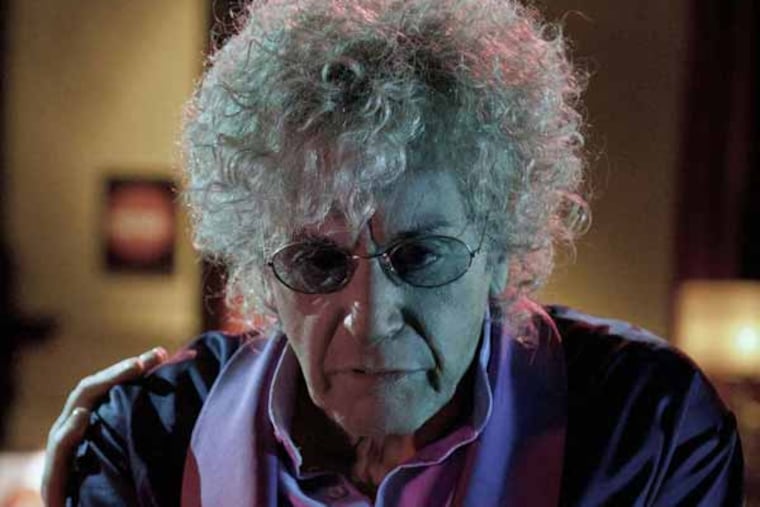Pacino stars as Spector
Ellen Gray: Two great actors and a great writer combine to make a questionable movie; plus creepy Russian models.

* PHIL SPECTOR. 9 p.m. Sunday, HBO.
* P.O.V.: GIRL MODEL. 10 p.m. Sunday, WHYY 12.
AL PACINO doesn't do much television work, but when he does, he seems to gravitate toward HBO - and controversial characters.
In 2003, he played a dying Roy Cohn in "Angels in America." In 2010, he was Jack "Dr. Death" Kevorkian in the perhaps too aptly named "You Don't Know Jack." And on Sunday, Pacino will be seen in a procession of wigs in the title role of "Phil Spector," an HBO film written and directed by playwright David Mamet that focuses on the eccentric music producer's first trial in the 2003 shooting death of Lana Clarkson.
That would be the trial in which the jury was deadlocked and a mistrial declared, and in which defense attorney Linda Kenney Baden (here played by Helen Mirren) gave the closing arguments. Not the untelevised retrial, in which Spector was convicted of second-degree murder and sentenced to 18 years to life.
You know how they say there are actors we'd watch read the phone book? Pacino and Mirren are charter members of that group.
But a phone book - almost as outdated an object as the vinyl records Spector once produced - wouldn't offer Mamet the scope of actual events from which he could pick and choose to form a narrative that may or may not reflect what actually happened.
"This is a work of fiction," viewers are warned at the beginning. "It's not 'based on a true story.' It is a drama inspired by actual persons in a trial, but it is neither an attempt to depict the actual persons, nor to comment upon the trial or its outcome."
And forgive me for my lack of class, but I have a problem with that.
Because an actual person is dead, and another actual person is in jail as a result.
And because as good as the performances are and as fascinating it might be to see the inner workings of a celebrity trial where money was apparently no object, "Phil Spector" plays like a docudrama, not "a work of fiction."
"Distorting the Spector case serves only to undermine the public's faith in the jury system," writes Los Angeles Times reporter Harriet Ryan, who covered both of Spector's trials and has a few bones to pick with the film's presentation.
I'm not sure a succession of trials involving people far more famous than Spector hasn't already undermined a lot of people's faith.
But I'm also not sure that what Mamet's trying to say here about celebrity justice is worth the risk of making things any worse.
'Girl Model'
PBS' "POV" series wraps ups its 25th season Sunday with "Girl Model," a disturbing documentary about a side of the modeling business that's far from super.
"Girl Model," by filmmakers Ashley Sabin and David Redmon, focuses on a former model, Ashley Arbaugh, who now recruits young Russian models, and on Nadya Vall, a 13-year-old from Siberia who wins a modeling contract to work in Japan.
The needs of the Japanese market are "quite specific, and so the girls have to be a certain height, not too tall. Cute, young - young is very important," explains the scout, who's presented with dozens of young, mostly very thin girls, many in bikinis and high heels.
"They love young girls in Japan," says Arbaugh, noting that Vall looks "like a prepubescent."
Blond and wide-eyed, Vall indeed looks less than physically mature, which makes the clause in her contract that says she can be terminated for even a centimeter increase in her bust, waist or hips all the more absurd.
But "Girl Model" isn't an expose of fashion's obsession with thinness. Instead, it's about the process of luring young girls far away from their families, offering them little support or supervision and keeping them largely in the dark about what they're being paid or if they're being paid at all.
And their pictures? Arbaugh, while claiming not to know where some may end up, tacitly acknowledges there's probably more at work here than fashion.
As ambivalent as she seems about the whole business, she herself keeps an odd little collection of shots of girls' hands and feet, some apparently photographed without the subjects' knowledge.
If that's not creepy, I don't know what is.
" @elgray
Blog: EllenGray.tv